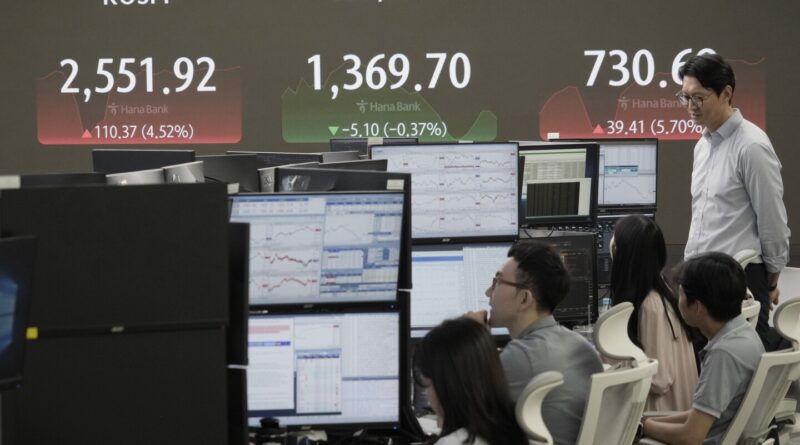What are car trades, and how did they contribute to this week’s global market turmoil?
BANGKOK (AP) – The turmoil that has engulfed global markets this week is partly due to a market strategy known as the “car trade”.
Japan’s benchmark Nikkei 225 fell 12.4% on Monday and the European and North American markets suffered huge losses as traders sell stocks to help cover the increased risks of investments made in cheaply backed funds that are heavily borrowed against the Japanese yen.
Markets recovered most of their losses on Tuesday. But the damage continues.
They were troubled by many factors, including fears of a recession in the United States, the world’s largest economy, and concerns that technology stocks are too high this year.
But the rate of decline was exacerbated by a rush to sell US dollars due to trade deals that helped drive markets to record levels.
What are carry trades?
Running a business involves borrowing cheaply in one currency to get high returns from investing in another currency. One of the most recent examples has been to borrow Japanese yen, expecting that the currency will remain cheap against the US dollar and that Japanese interest rates will remain low. The borrowed money would be invested in the US stocks and Treasury bonds in anticipation of higher interest rates.
Why have traders been comfortable trading their goods?
The main factor behind the car business is the difference in profit margins. The Bank of Japan has kept interest rates at or near zero for years, trying to encourage more spending and grow the economy. Last week, it raised it an interest rate of about zero. Higher interest rates tend to raise the value of a country’s currency, and the Japanese yen rose against the US dollar. Traders insisted on selling high-risk, dollar-denominated assets in order to cover the sudden high cost of borrowing, as well as the loss of foreign exchange rate fluctuations and the loss of asset value. while prices are falling. Also, hedge funds that conduct trading use computer models to help maximize their returns against their risks. They needed to sell shares to maintain an acceptable level of risk.
Why do stock trades have a huge impact on the markets?
Trading activity tends to make more sense when foreign exchange rates are stable and investors can find high market opportunities, such as recent stock prices in places like the United States. Recent market changes oblige traders to cover their debts by buying yen and other trading currencies and selling more risky assets that they bought under more favorable conditions. Also, auto trading is profitable when stocks or other investments are rising, but losses can snowball when thousands of traders are forced to sell stocks or other assets at a time. and one. Stephen Innes of SPI Asset Management said: “A major global trade shock was the spark that ignited this market Armageddon.” “One explanation for these markets melting is a vicious cycle where sales increase volatility.”
What is the future risk of trading stocks?
The gap between Japan’s key interest rate, currently 0.25%, and the Federal Reserve’s 5%-5.25% rate remains wide but is likely to narrow as the Fed cuts rates and Japan raises fees. Financial markets appeared to be quiet on Tuesday, with Japan’s Nikkei 225 index gaining 10.2% and other markets higher. Analysts have different opinions about whether this problem of instability in the markets has passed or there is something more to come. Regardless, the car business has been around for decades. They contributed to the collapse of Iceland’s financial sector in 2007-2008 where investors borrowed yen or Swiss francs to take advantage of Iceland’s high interest rates. During this latest market turmoil, Mexico, another target for the yen trade, saw its peso fall more than 6%. A popular but potentially difficult trading strategy may remain a wild card for investors, especially in times of market volatility.
#car #trades #contribute #weeks #global #market #turmoil

